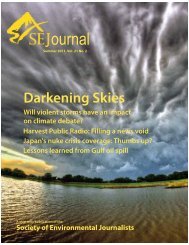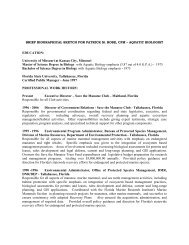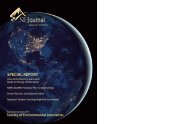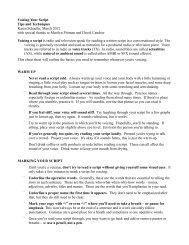PDF Download - Society of Environmental Journalists
PDF Download - Society of Environmental Journalists
PDF Download - Society of Environmental Journalists
Create successful ePaper yourself
Turn your PDF publications into a flip-book with our unique Google optimized e-Paper software.
E-Reporting Biz<br />
By BUD WARD<br />
Climate change/global warming issues may well turn out to<br />
be “the story <strong>of</strong> the century” as many science and environmental<br />
journalists have said. But that doesn’t necessarily make it the<br />
story <strong>of</strong> the day, week, month or year. One need only recall the<br />
“Deepwater Horizon” disaster in the Gulf <strong>of</strong> Mexico or the sweeping<br />
coverage given the economic collapse (or, one suspects, <strong>of</strong> the<br />
coming presidential election campaign).<br />
So, for environmental reporters increasingly having to juggle<br />
multiple beats and assignments from editors or finicky demands<br />
<strong>of</strong> an ever-changing freelance career, how to best stay atop the<br />
climate change issues? They’re issues, after all, that are<br />
rapidly changing and evolving, notwithstanding the certainly<br />
glacial pace, no pun, <strong>of</strong> the overall impacts.<br />
What follows are some “must see” resources and websites for<br />
journalists wanting to remain abreast <strong>of</strong> climate change …but also<br />
needing to split their time and attention among numerous issues.<br />
The universe <strong>of</strong> potential candidates surely is enormous, and no<br />
single “best <strong>of</strong>” list is likely to suit all needs. But for a start,<br />
reporters new to the climate change issue and those having to<br />
immerse themselves into it while also grappling with a range <strong>of</strong><br />
other important environmental (and, given the nature <strong>of</strong> today’s<br />
newsrooms, also non-environmental) issues, might try these:<br />
‘Must Read’ Books —<br />
The Discovery <strong>of</strong> Global Warming: Revised and Expanded<br />
Edition, by Spencer R. Weart (American Institute <strong>of</strong> Physics,<br />
retired), Harvard University Press, 2008, 230 pages.<br />
ISBN-13:978-0-674-03189-0 (paper).<br />
If you can read only one book on climate change, this should<br />
be it. Scientifically rigorous and authoritative, but very<br />
accessible and understandable.<br />
The Rough Guide to Climate Change: The Symptoms, The<br />
Science, The Solutions, by Robert Henson (University<br />
Consortium for Atmospheric Research), Rough Guides, Ltd./<br />
Penguin Books, Ltd., 2009. 352 pages. ISBN 10: 1-84353-711-7<br />
(paper).<br />
But you really shouldn’t stop at one book …and Henson’s<br />
“Rough Guide” should definitely be the second one you read.<br />
From “the basics” <strong>of</strong> a primer, greenhouse effect, and “Who’s<br />
responsible?” … to symptoms and impacts ranging from high<br />
heat; floods and droughts; severe storms; ocean, ecosystem, and<br />
For climate change reporters,<br />
here’s an essential reading list<br />
agricultural impacts; to the underlying science; and mitigation/adaptation<br />
strategies. Rock-solid scientifically.<br />
Americans and Climate Change: Closing the Gap Between<br />
Science and Action, by Daniel R. Abassi, Yale School <strong>of</strong> Forestry<br />
& <strong>Environmental</strong> Studies Publication Series, 2006, 210 pages.<br />
ISBN-0-0707882-4-X (paper).<br />
Based on a high-powered 2005 Aspen, Colorado, conference<br />
spearheaded by then-Yale Forestry Dean Gus Speth. Just a tad<br />
dated now, but still provides timeless insights into what drives<br />
America and Americans on climate change. A bit more emphasis<br />
on policy than on underlying science, but effectively links the two.<br />
“Should Read” Books<br />
(“Wish I Could Find Time to Read Books … ”) —<br />
Why We Disagree about Climate Change, by Mike Hulme,<br />
Cambridge University Press, 2009, 432 pages. ISBN-978-<br />
0521727327 (paper).<br />
A respected British scientist and academic takes a swing at<br />
better understanding “both sides” <strong>of</strong> the climate science<br />
debates …and hits a homer, or at least a triple. His points are<br />
universal and global in relevance, not simply “British.”<br />
Ten Technologies to Save the Planet: Energy Options for a Low-<br />
Carbon Future, by Chris Goodall, Greystone Books, 2008 and<br />
2010, 320 pages. ISBN-978-1-55365-525-1 (paper).<br />
12 SEJournal Spring 2011












